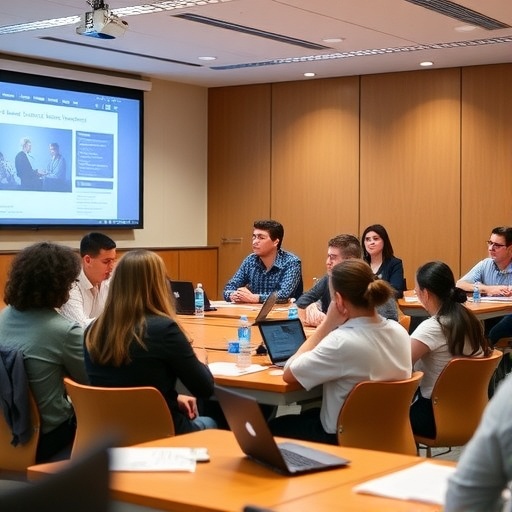In today’s rapidly evolving educational landscape, engaging graduate students in active learning environments has become a critical focus for educators. The necessity of fostering a deep, interactive, and vibrant classroom dynamic is underscored in a recent study published in Biomed Eng Education. This research, conducted by Bullard, Dubell, and Patrick, explores the concept of scaffolding active learning activities to enhance student engagement within graduate seminars. By breaking down traditional teaching methodologies and integrating inventive pedagogical strategies, this study demonstrates how academic success relies heavily on student participation and enthusiasm.
Central to the study’s findings is the idea that graduate students are often rooted in passive learning methodologies. These outdated paradigms not only stifle creativity but also limit the development of critical thinking skills essential for thesis work and professional pursuits. The researchers advocate for a shift toward active learning, where students engage with the material, collaborate with peers, and participate in discussions that stimulate intellectual curiosity. The study articulates a framework that faculty can adopt to facilitate this transition, stressing the importance of preparing an academic environment that encourages exploration and inquiry.
The researchers employed a variety of active learning strategies aimed at engaging students more comprehensively. Techniques such as peer teaching, problem-based learning, and collaborative projects help bridge the gap between theoretical knowledge and practical application. For instance, by implementing peer teaching methods, students can reinforce their understanding of course material by explaining complex concepts to their classmates. This collaborative approach not only deepens comprehension but also fosters a sense of community within the classroom, which is crucial for graduate-level coursework.
In addition, the study highlights the significance of structured scaffolding in these learning activities. By providing supportive frameworks that guide students through their learning journey, educators can empower them to take greater ownership of their academic progress. Scaffolding involves breaking concepts into manageable increments, allowing students to build on their knowledge progressively. Such an approach is particularly beneficial in graduate seminars, where theories can rapidly become convoluted without proper guidance.
Engagement is further enhanced through the integration of technology in teaching practices. The researchers note that leveraging digital tools—like learning management systems, interactive simulations, and online resources—can captivate students’ attention while delivering critically important content. By blending traditional lectures with technology-driven activities, educators can create a more dynamic and versatile learning atmosphere that caters to a variety of learning styles. This integration of technology not only aids comprehension but also prepares students for a tech-savvy workforce.
Through qualitative assessments, the authors of this study were able to gather irrefutable evidence demonstrating heightened student engagement as a result of these active learning structures. Students reported feeling a greater sense of belonging within their academic communities and expressed their appreciation for the collaborative nature of the activities. This feedback underlines a paradigm shift in academic teaching approaches: creating an inclusive and supportive learning environment significantly enhances the educational experience and success of graduate students.
Indeed, the connection between student engagement and academic performance cannot be overstated. Graduate students who are actively participating in their education are more likely to retain information, deepen their understanding, and excel in their courses. The study emphasizes that fostering engagement is not just about altering teaching styles; it is a holistic approach that incorporates student feedback, adaptation of materials, and continuous assessment of educational methods.
Importantly, the researchers recognized that implementing these engaging teaching strategies does not come without challenges. Faculty members often struggle with time constraints and the necessity of curriculum changes that may seem monumental. However, the study advocates for small, manageable changes that can yield significant results over time. By gradually incorporating active learning strategies into seminar formats, educators can ease the transition for both themselves and their students.
Ultimately, this pioneering research provides a roadmap for enhancing graduate education, calling for a concerted effort from academic institutions to prioritize student engagement through innovative pedagogical approaches. By investing in the development of active learning environments, schools can transform the educational experience and prepare students to think critically and work collaboratively in their future careers.
The implications of this study extend beyond the classroom. As higher education evolves to meet the demands of a diverse and rapidly changing job market, the cultivation of engagement and active participation among students becomes increasingly vital. Schools that embrace these strategies are likely to produce graduates who are not just knowledgeable but also equipped with the skills to innovate and lead in their respective fields.
In conclusion, the research conducted by Bullard, Dubell, and Patrick stands as a compelling call to action for educators everywhere. By recognizing the value of student engagement and scaffolding active learning experiences, academic institutions can fundamentally transform graduate education. This transformation is essential not only for enhancing individual student success but also for shaping a more dynamic and responsive future workforce.
Subject of Research: Enhancing Student Engagement in Graduate Seminars
Article Title: Enhancing Student Engagement in the Graduate Seminar by Scaffolding Active Learning Activities
Article References:
Bullard, E.A., Dubell, C.R., Patrick, C.W. et al. Enhancing Student Engagement in the Graduate Seminar by Scaffolding Active Learning Activities.
Biomed Eng Education 4, 275–282 (2024). https://doi.org/10.1007/s43683-024-00144-8
Image Credits: AI Generated
DOI: https://doi.org/10.1007/s43683-024-00144-8
Keywords: Active Learning, Student Engagement, Graduate Education, Scaffolding, Educational Innovation, Collaborative Learning, Higher Education.




